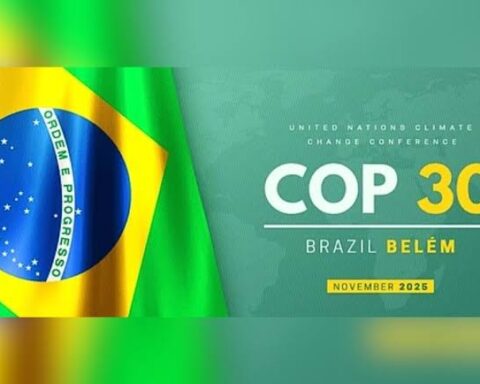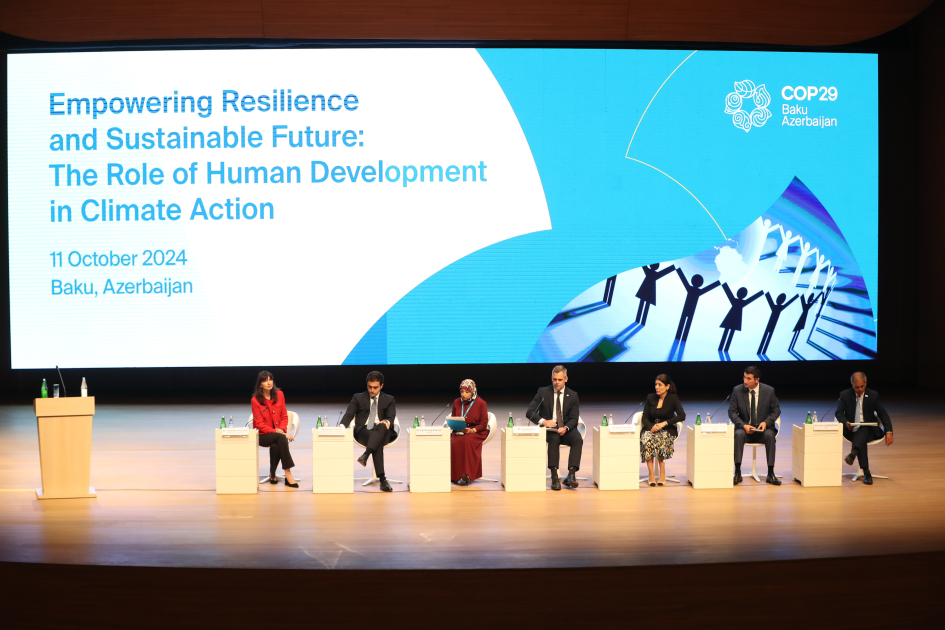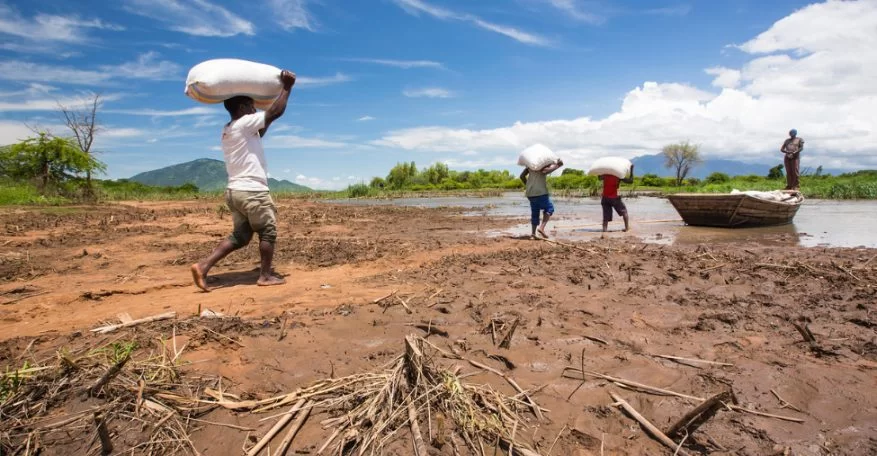The next UN climate conference, COP29, is taking place a month today in Azerbaijan’s capital of Baku.
In a week marred by deadly flooding in eastern Europe and a “berserk” climate-fueled hurricane in the US, it is painfully evident that the climate crisis continues to escalate beyond our efforts to temper it.
For a fortnight from 11 to 22 November, the world will be looking to leaders to ramp up climate action and afford stronger protection to those on the frontlines.
COP29 is billed as the ‘finance COP’, because it is time for countries to set a new global climate finance goal. Ahead of COP30 in Brazil next year, they also need to submit stronger national climate commitments.
And after some wins at COP28 in Dubai last year – including the official launching of a new loss and damage fund for climate victims – developing countries are anxious for past commitments to be honoured and improved on.
A month is a long time in global affairs. Devastating conflict in the Middle East, and the US election in early November, will influence the negotiations in various ways. But given the timeframes built into the UNFCCC process, here are the key issues heading into the summit.
What was agreed at COP28?
As required by the Paris Agreement which has guided global climate action since 2015, the main outcome agreed at COP28 was the first ever ‘global stocktake’.
For the first time at a climate COP, the final text actually named fossil fuels – and called for all countries to “transition away” from them. Despite this progress, the decision shied away from the full “phase-out” many said was needed to stay below 1.5C global heating.
The outcome also called on countries to contribute to the global tripling of renewable energy capacity by 2030.
Following the historic agreement to create a loss and damage fund at COP27 – to effectively compensate climate-vulnerable countries – COP28 succeeded in officially launching the fund.
The finer details remain to be figured out in Baku, before the money actually starts flowing to nations in need next year.
Why is COP29 being called the ‘finance COP’?
For the first time in 15 years, countries will need to agree to a new global finance goal, known as the new collective quantified climate finance goal (NCQG).
This will update the target set in 2009 when developed countries pledged to mobilise $100 billion (€91.4 bn) a year by 2020 to help developing countries mitigate and adapt to climate change. A promise they only managed to deliver on in 2022.
With the crisis intensifying, the actual amount of climate finance that developing countries now need is estimated to be in the region of $500 billion dollars to over $1 trillion a year. There are big challenges to bridging the minimum that they will be willing to accept in a deal, and the maximum that developed countries are willing to put themselves on the hook for.
As well as the total figure, COP29 will see much wrangling over the terms of the NCQG, including: who the donor base and recipients will be; how much will come from public and private sources; and whether it will be in the form of grants or loans.
Where does the EU stand on climate finance?
EU ministers approved their conclusions on climate finance earlier this week, committing to continue to collectively mobilising $100 billion per year until 2025 and to set an “ambitious” NCQG for thereafter.
The council is expected to adopt its final negotiating mandate for COP29 on 15 October. Currently, the climate finance text stresses that international public finance should be at its core and be provided by a “broader base of contributors, including those countries that are capable of contributing.”
Michael Bloss, climate and industrial policy spokesperson for the Greens in the European Parliament, tells Euronews Green that “$100 billion per year is nowhere near enough.”
“Our priority is clear: balance funding across mitigation, adaptation, and loss and damage, with strict interim targets,” he adds. “Grants must replace loans to break the cycle of debt and unlock true potential for sustainable development.”
It remains to be seen whether the NGQG will have specific sub-goals for adaptation and loss and damage funding. The former is more likely, according to Alden Meyer, a senior associate at the E3G climate think tank. For the last few years, developing countries have been fighting for 50 percent of finance to be allocated towards adaptation – given the urgent need to adjust to climate change.
Laying the ground for stronger NDCs
Also fast approaching under the Paris Agreement is the deadline for countries to submit new Nationally Determined Contributions (NDCs), outlining how they will curb emissions.
These must be renewed every five years, with the next round due in February 2025. So COP29 is a crucial moment for countries to raise the bar and hold each other to account.
NDCs should include sector-specific targets, such as concrete goals for shifting to emissions-free energy and food systems, the World Resources Institute (WRI) notes.
During a recent high-level event, the troika of presidencies – the UAE, Azerbaijan, and COP30 host Brazil – indicated that their NDCs will either be announced at COP or by the end of the year.
But despite some stirring rhetoric on “keeping 1.5C alive”, Meyer said the leaders had little information on how they would act on last year’s global stocktake.
“I was struck by the fact that the troika presidencies said nothing about reforming their current intentions to expand production and export of fossil fuels,” he told the press during a subsequent briefing. “All three of them have plans to dramatically scale up investment in that sector.”
COP29 has the mammoth task of bringing rhetoric closer to reality.
Turning energy ambition into action
“This is going to be a finance COP that we’re heading into,” said Leo Roberts, an energy transition expert at E3G during the same briefing. “But that doesn’t mean that energy is no longer relevant – in fact, it makes it extremely important that it’s not dropped.”
With the global stocktake decision, COP28 concluded with a set of global efforts that countries were called on to contribute to, including: tripling renewable energy capacity and doubling energy efficiency by 2030; phasing down coal power; and transitioning away from fossil fuels.
“It’s quite clearly a package, not a menu,” said Roberts, flagging a worrying selectiveness around the fossil fuel side of the equation. He also noted a lack of coherence about how countries are linking ambition on the global energy transition to financing.
In his first official letter to parties, COP29 President-Designate Mukhtar Babayev emphasised that the summit’s two pillars will be enhancing ambition and enabling action.
The latest IEA report finds that the world is currently only on track for increasing renewable energy capacity by 2.7 times by 2030, so more action and financial support is needed on this front.
Who is going to COP29?
World leaders will be arriving at Baku Stadium for the World Leaders Climate Action summit at the start of COP on 12 and 13 November.
As in previous years, this will be a chance for heads of state to convene before their negotiators get down to business. The biggest names tend to be confirmed nearer the time.
But in a sign that the event will be slimmer than the record-breaking list of over 65,000 attendees last year, numerous finance bosses have said they plan to skip the summit this year.
Despite the focus on private finance, the heads of Bank of America, BlackRock, Standard Chartered and Deutsche Bank are not attending, the Financial Times reports, with some arguing this is a “technical COP” less suited to business.
The UK’s veteran climate attender King Charles is also reportedly giving COP29 a miss.
But Azerbaijan’s president Ilham Aliyev is sure to be welcoming many more world leaders including Barbadian Prime Minister Mia Mottley, a champion of more equitable climate action. Now head of the V20 group of climate-vulnerable countries, Mottley will be bringing more radical ideas for financial reform under the Bridgetown Initiative.
Civil society organisations and climate campaigners will be traveling to Azerbaijan too – another petrostate host that has drawn scrutiny for its human rights record.
“Climate action must be holistic, with justice at its core,” adds EU Greens spokesman Bloss. “This includes holding COP host Azerbaijan accountable for its precarious human rights situation and demanding full freedom for civil society and national climate activists to act without restraint.
By Lottie Limb
Culled from Euronews







